One of the things that makes movie-going such an enjoyably unpredictable business is that every once in a while, a lowbrow comedy tells us more about ourselves than all the self-serious Oscar-baiting epic films and self-congratulatory polemical books by talking heads ever could.
 Take Talladega Nights: The Ballad of Ricky Bobby. Will Ferrell’s comedy, in addition to giving us some of the most quotable lines of the year, provided a great snapshot of our culture. Espn.com columnist Bill “The Sports Guy” Simmons, whose column format I am about to shamelessly rip off, said the movie was blue-state America having a laugh at red-state America without the latter catching on.
Take Talladega Nights: The Ballad of Ricky Bobby. Will Ferrell’s comedy, in addition to giving us some of the most quotable lines of the year, provided a great snapshot of our culture. Espn.com columnist Bill “The Sports Guy” Simmons, whose column format I am about to shamelessly rip off, said the movie was blue-state America having a laugh at red-state America without the latter catching on.
He’s wrong about that — I think plenty of folks in both camps recognized parts of themselves in Ricky Bobby and his French nemesis, played by Sacha Baron Cohen. Vulgar rednecks and snobbish aesthetes alike had a good laugh at their own shortcomings, while perhaps gaining a better understanding of the other guy. Heck, the movie could persuade warring Sunnis and Shiites in Iraq to stop fighting and embrace each other. … OK, maybe not.
Still, this collection of some of the best punch lines from the movie might remind you of a country you know pretty well. It’ll certainly give me an opening to talk about a bunch of the year’s best, worst, and most interesting movies. Get ready — the matador’s about to dance with the blind shoemaker.
” ‘America is all about speed. Hot, nasty, badass speed.’ — Eleanor Roosevelt”
The former first lady speaks the truth, even if the quote (which appears on a black title card at the beginning of Talladega Nights) is entirely made up. Soundbite-trained audiences have learned to absorb large amounts of information in small amounts of time, so filmmakers all over the world are packing more narrative into tighter spaces, and as a result, movies run faster. Check out the opening of Alfonso Cuarón’s Children of Men, in which the film’s hero has the first of many brushes with death while buying his morning coffee. That wakes him up. Us, too.
“Nothin’ hones your mind and your instincts like necessity, so I taped a kilo of cocaine underneath your car and called the boys in blue.”
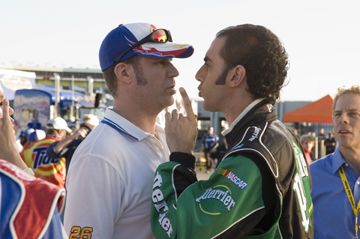 This is how Ricky Bobby’s daddy rekindles his son’s hunger for racing — apparently NASCAR drivers, like the rest of America, are hooked on cop shows, and the world has taken its cue from us. The Departed and Inside Man were good crime pictures that you probably saw this year. One you probably haven’t seen is Fabián Bielinsky’s The Aura, since it has yet to play Dallas, much less Fort Worth. This masterful, existentially spooky Argentinian caper flick, about an epileptic taxidermist caught up in an armored car heist, was the second and last film for Bielinsky, who died suddenly in June at age 47. The loss to South American cinema is incalculable.
This is how Ricky Bobby’s daddy rekindles his son’s hunger for racing — apparently NASCAR drivers, like the rest of America, are hooked on cop shows, and the world has taken its cue from us. The Departed and Inside Man were good crime pictures that you probably saw this year. One you probably haven’t seen is Fabián Bielinsky’s The Aura, since it has yet to play Dallas, much less Fort Worth. This masterful, existentially spooky Argentinian caper flick, about an epileptic taxidermist caught up in an armored car heist, was the second and last film for Bielinsky, who died suddenly in June at age 47. The loss to South American cinema is incalculable.
“Cal, I don’t mean to add to your tremendous moral confusion, but Dennit says if you don’t take Ricky Bobby out, you’re fired.”
God knows that Cal Naughton Jr. isn’t the only one who’s feeling conflicted. With Western governments grappling ineptly with today’s problems, and our administration busily ripping out parts of the Constitution, moral confusion is the lot of any thinking person these days. Maybe that’s why crowds flocked to Martin Scorsese’s The Departed, which also happened to be an excellent crime flick (as I mentioned above). Scorsese took a Hong Kong cop movie and deftly rejiggered it to fit the racially charged atmosphere of underworld Boston. Thinking of the world as divided up into good guys and bad guys has led us into a lot of trouble lately. That’s why the ethical ambiguity in this thriller filled with disguises and double crosses was something of a tonic. So was one of our nation’s most celebrated filmmakers finally directing a really good movie that large crowds went to see.
“If you ain’t first, you’re last.”
Like a great many Americans, Ricky Bobby lives his life by this sports-hero maxim, handed down to him by his daddy, Reese. Two excellent documentaries this year that examined our love of sports champions should have found bigger audiences than they did. Ward Serrill’s The Heart of the Game took five seasons’ worth of high school girls’ basketball in the Seattle area and turned it into Shakespearean drama. Paul Crowder and John Dower’s Once in a Lifetime: The Extraordinary Story of the New York Cosmos profiled a forgotten chapter in American sports history, when a soccer team in the Big Apple outdrew both of the city’s NFL teams by winning championships and fielding some of history’s greatest players. In a year bookended by insipid Hollywood sports dramas inspired by real life (Glory Road in January, We Are Marshall in December), these flicks for grown-up sports fans deserved trophies.
” I’m the best there is, plain and simple. I wake up in the morning and I piss excellence. … I’m just a big hairy American winnin’ machine.”
Will Ferrell has said in interviews that his portrayal of Ricky Bobby drew heavily from his impression of George W. Bush, which he honed during his last years on Saturday Night Live. Of course, the movie is about the arrogant, self-satisfied Ricky getting his comeuppance from Jean Girard. The Prez, on the other hand, had the midterm elections. Before that, Bush’s policies and American hubris in general inspired yet another slew of political films, most of them documentaries (Our Brand Is Crisis), some docudramas (The Road to Guantánamo), and some disguised as pop entertainment (American Dreamz). The best one was Deborah Scranton’s harrowing The War Tapes, edited together from footage shot by three U.S. soldiers while they served in Iraq. What they captured wasn’t combat but rather the palpable atmosphere of nerve-frying tension in a landscape where violence may erupt even while you’re driving on a deserted road. I don’t have a flippant remark to end this item, so I’ll just wish our troops a safe return home and move on.
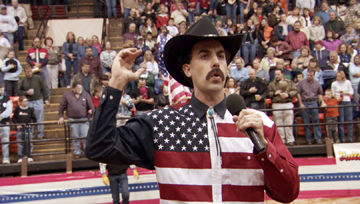 JEAN: “What have you [Americans] given us apart from George Bush, Cheerios, and ze Thighmaster? … We invented democracy, existentialism, and ze ménage à trois.”
JEAN: “What have you [Americans] given us apart from George Bush, Cheerios, and ze Thighmaster? … We invented democracy, existentialism, and ze ménage à trois.”
CAL: “Those are three pretty good things.”
With this one exchange, Jean’s portrayer, Sacha Baron Cohen, does a better job of skewering American jingoism than he did in all of Borat. That film got a lot of press for supposedly revealing America’s flaws, but Baron Cohen’s act there was really nothing more than a cunningly devised trap. When confronted by Borat, his interview subjects basically have three options, all of them bad. They can pretend not to hear when he spouts off about Jews and women, which makes them seem to be tolerating prejudice. They can get huffy and call him out, looking clueless in the process. Or they can agree with him, in which case, God help them. Don’t get me wrong, Borat was a funny movie, but bruising social satire about America it wasn’t.
“With all due respect, that idea ain’t worth a velvet painting of a whale and a dolphin gettin’ it on.”
At least Borat was based on a workable premise. There are tons of movies every year that leave you wondering what the filmmakers were snorting — they apparently think the American public will buy just about anything. Here’s to 2006’s crop: Fur: An Imaginary Portrait of Diane Arbus, Perfume: The Story of a Murderer, Lady in the Water, Little Man, The Promise, Running Scared, BloodRayne, and Sorry, Haters. I’m sure there are a few more I’ve blessedly forgotten. Crowning them all was Lars von Trier’s Manderlay, a truly knuckleheaded examination of American race relations that got so much wrong that it was unintentionally funny. I wish I could have told von Trier that his idea for that movie wasn’t as good as interspecies porn rendered in paint. I might have flown to Denmark just to see the look on his face.
“I’m on fire! Help me, Jesus! Help me, Jewish God! Help me, Allah! Aaaaah! Help me, Tom Cruise! Tom Cruise, use your witchcraft to put the fire out!”
 Mel Gibson’s Apocalypto wasn’t as crazy as many of the movies in the preceding item, but his real-life meltdown dwarfed even Ricky Bobby’s. We all love our celebrity meltdowns. They add spice to our boring lives, and they give rise to that all-American form of expression, the mediathon. An outburst on Mel’s scale is good for at least a week’s worth of navel-gazing, self-righteous bloviating, and that peculiar sense of moral superiority that we seem to enjoy more than any other people. An incident like this can be tough to overcome — despite the immediate mea culpa no doubt prompted by Mel’s publicist. Such apologies often ring hollow, however. What the culprits really need to do is lock themselves in a room until they figure out why they said what they said. Of course, the other option is to not care what the public thinks. Ask Tom Cruise about that one. (Bonus “I’m on fire!” to Lindsay Lohan. When even Tara Reid says you’re partying too much, you should look into spending a few evenings per week at home curled up with a George Eliot novel.)
Mel Gibson’s Apocalypto wasn’t as crazy as many of the movies in the preceding item, but his real-life meltdown dwarfed even Ricky Bobby’s. We all love our celebrity meltdowns. They add spice to our boring lives, and they give rise to that all-American form of expression, the mediathon. An outburst on Mel’s scale is good for at least a week’s worth of navel-gazing, self-righteous bloviating, and that peculiar sense of moral superiority that we seem to enjoy more than any other people. An incident like this can be tough to overcome — despite the immediate mea culpa no doubt prompted by Mel’s publicist. Such apologies often ring hollow, however. What the culprits really need to do is lock themselves in a room until they figure out why they said what they said. Of course, the other option is to not care what the public thinks. Ask Tom Cruise about that one. (Bonus “I’m on fire!” to Lindsay Lohan. When even Tara Reid says you’re partying too much, you should look into spending a few evenings per week at home curled up with a George Eliot novel.)
“Should I tell them how, after 14 years of marriage, you’re still afraid to let me see you naked?”
Hmm, Ricky Bobby’s boss and his wife seem to have a few intimacy issues going on. Fear of intimacy and fear of movies about relationships — especially for guys who were dragged to see Failure to Launch — is all too common in our culture, of course. The best 2006 movies on that score were the ones that we didn’t see: Andrew Bujalski’s Mutual Appreciation (which never reached Dallas, let alone Fort Worth), Cédric Klapisch’s Russian Dolls (ditto), and Todd Field’s Little Children (which played in Dallas and might be brought back if the Oscar voters smile on it). Russian Dolls is at least available on DVD. That doesn’t change the fact that our nation’s film distributors, much like Mr. Dennit, too often don’t let us see the good stuff.
“There’s only one good thing about comin’ to these races, and that is the vibrations from the cars! Oh, I love when those cars whiz by! I can feel the motor runnin’ up my legs!” [moans orgasmically]
Prudes of every stripe who think of America as a decadent, sex-obsessed place surely wouldn’t be surprised that Mrs. Dennit uses the races to get her ya-yas. I say if it works for her, and her husband isn’t getting it done in the bedroom, she damn well should be starting her engines. A fresh angle on the often tired subject of sexuality in our culture came this year from Caveh Zahedi’s eye-catchingly titled I Am a Sex Addict, which didn’t play in local theaters because of its NC-17 rating. (By the way, Kirby Dick’s flawed but entertaining documentary This Film Is Not Yet Rated discussed how the ratings board keeps audiences from good movies like this one.) Zahedi unflinchingly retraced his own long-established pattern of dealing with marital strife by compulsively employing prostitutes. This may sound grim, but the movie played like Annie Hall, with comic asides and cheesily re-enacted sequences. Lots of naked hot chicks here. Also lots of naked Zahedi. Nasty as that is, Mrs. Dennit might go for it, as well as for the nebulous but intriguing The Notorious Bettie Page. After seeing it back in April, I prepared a whole essay on why movies about porn always fail, and I was going to break it out when I reviewed this film. The movie never played Tarrant County. Guess my essay will have to wait. Oh, and Gretchen Mol looks much better naked than either Zahedi or Will Ferrell.
“Hi, I’m Ricky Bobby. When you work on your mysterious lady parts and stuff, you should have the right tools, too. That’s why you should use Maypax, the official tampon of NASCAR.”
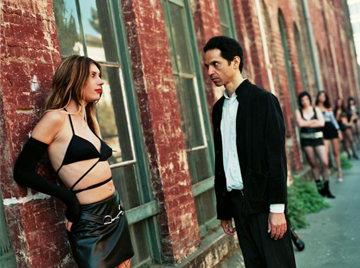 Unfortunately, Hollywood often displays Ricky Bobby’s level of understanding when it comes to women, and one result is that there weren’t that many female-driven movies among this year’s best. It’s hard to argue that we’re all better off for this. The old Hollywood thinking that women will pay to see “men’s films” but men won’t do the same for “women’s films” is now being applied to audiences overseas as well as here. That translates to even more franchises and action flicks from the major studios and fewer dialogue- and character-driven dramas and comedies that tend to give female roles more play, which means that actresses are being squeezed for roles even at the highest levels. There’s not much hope that things will improve, and yet … and yet this same year The Devil Wears Prada was a huge financial success, not only in this country but also abroad. Executives and industry observers repeatedly expressed surprise over this. Why? It was an intelligent, well-made film with a story many people can relate to (working for a terrible boss), and a multiple Oscar-winner headlining a cast filled with beautiful young women wearing chic outfits. Is it really a shock that Germans and Brazilians would find this appealing? If Hollywood would just put a little more faith in audiences and act accordingly, it’d turn out much more interesting movies. Also bearing the standard for female-centric pictures this year: Dreamgirls, The Queen, Notes on a Scandal, and the upcoming The Dead Girl. The most complex woman in 2006’s movies was the title character in the insane Korean movie Lady Vengeance. Lee Yeong-ae, playing an ex-con tracking down a child killer, is an elusive combination of languorous seductress, self-sacrificing martyr, and avenging demon. There’s a mysterious lady part for you, Ricky Bobby.
Unfortunately, Hollywood often displays Ricky Bobby’s level of understanding when it comes to women, and one result is that there weren’t that many female-driven movies among this year’s best. It’s hard to argue that we’re all better off for this. The old Hollywood thinking that women will pay to see “men’s films” but men won’t do the same for “women’s films” is now being applied to audiences overseas as well as here. That translates to even more franchises and action flicks from the major studios and fewer dialogue- and character-driven dramas and comedies that tend to give female roles more play, which means that actresses are being squeezed for roles even at the highest levels. There’s not much hope that things will improve, and yet … and yet this same year The Devil Wears Prada was a huge financial success, not only in this country but also abroad. Executives and industry observers repeatedly expressed surprise over this. Why? It was an intelligent, well-made film with a story many people can relate to (working for a terrible boss), and a multiple Oscar-winner headlining a cast filled with beautiful young women wearing chic outfits. Is it really a shock that Germans and Brazilians would find this appealing? If Hollywood would just put a little more faith in audiences and act accordingly, it’d turn out much more interesting movies. Also bearing the standard for female-centric pictures this year: Dreamgirls, The Queen, Notes on a Scandal, and the upcoming The Dead Girl. The most complex woman in 2006’s movies was the title character in the insane Korean movie Lady Vengeance. Lee Yeong-ae, playing an ex-con tracking down a child killer, is an elusive combination of languorous seductress, self-sacrificing martyr, and avenging demon. There’s a mysterious lady part for you, Ricky Bobby.
“The entire field was in the wreck!”
If Hollywood showed not enough faith in female or foreign audiences, maybe it showed too much in the kids, as the studios put out entirely too many animated movies this year. Ticket-buyers couldn’t pick out the good stuff from crap such as Ice Age: The Meltdown, The Wild, and Open Season. The glut depressed the box-office performance of that other movie this year about auto racing, Cars. It also prevented the likes of Over the Hedge and Monster House from finding the audience that they might otherwise have had. Even the kiddie audience can be overtapped, it seems.
“We’ll use this knife to pry it out!”
After Ricky Bobby stabs himself in the leg, his pals decide a second knife will help the problem. (In multiple viewings of Talladega Nights, this consistently got the biggest laugh. “Cut around the meat!”) This scene reminds me of Warner Brothers, which made a poor decision to use one Clint Eastwood film to rescue the other. The director’s World War II drama Flags of Our Fathers was touted as an Oscar contender when it came out in October. Audiences stayed away, though, and a minority of critics, including me, found the movie dull and slack. As a result, Warners rushed Eastwood’s Letters From Iwo Jima — shot simultaneously as a companion piece to Flags of Our Fathers — into theaters to help the first movie’s Oscar chances. Now it looks as if Letters will effectively torpedo Flags, as it’s receiving even better reviews. Its prospects for box-office Oscar nominations are still shaky, though, because the movie is performed almost entirely in Japanese. (Also, my colleagues are seriously overpraising it. That’s all I’ll say for now.) Warners appears to have found its way into a situation that there’s no good way out of.
“I’m not stupid, Lucius. No one lives forever. But with advances in modern science and my high-level income, it’s not crazy to think I can live to be 245, maybe 300.”
Ricky Bobby’s faith in the future, like the traditional American faith in junk science, is touching. Maybe if he’d seen some of this year’s science-fiction movies, he wouldn’t be so keen on living that long. Whether 2006’s sci-fi was middlebrow like V for Vendetta, highbrow like The Fountain, or utter crap like Ultraviolet, it always presented the future as way worse than the present. Best of these were the upcoming Children of Men, which envisioned Britain in 2027 as a place much like present-day Iraq, and the vastly enjoyable martial-arts flick District B13, which followed France’s class and race divisions to an apocalyptic end in the near future. Remember the 1990s, when everyone said the decade’s dark sci-fi movies were a symptom of pre-millennial anxiety, and that once the calendar flipped over, science fiction would be giving us a steady stream of utopian fantasies? It ain’t happening this year.
“So when you say his injuries are psychosomatic, does that mean he can, like, start a fire with his thoughts?”
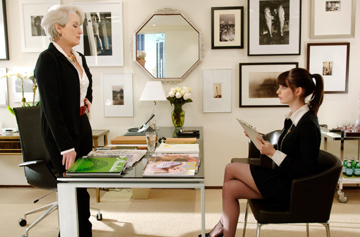 Jean Girard may claim democracy and three-ways for France (wrong on both counts, by the way), but we Americans created Superman, Batman, and all their kind. It’s a sign of our continuing faith in the power of exceptional human beings to save the planet. It’s also something to occupy the time of guys who don’t have much experience with three-ways. With Hollywood more financially dependent than ever on its superhero franchises, this year’s entries proved to be a mixed bag. Bryan Singer’s Superman Returns ultimately failed to reinvigorate The Man of Steel despite some promising early stretches. Meanwhile, the X-Men franchise that Singer left was taken over by Brett Ratner, who did a surprisingly good job in his place and ensured that this intelligent superhero series would live to fight another day. Over in Russia, Timur Bekmambetov created a franchise all his own with the gritty, nonsensical, intriguing Night Watch. Worth mentioning: All these movies were outpointed by the new NBC tv series Heroes.
Jean Girard may claim democracy and three-ways for France (wrong on both counts, by the way), but we Americans created Superman, Batman, and all their kind. It’s a sign of our continuing faith in the power of exceptional human beings to save the planet. It’s also something to occupy the time of guys who don’t have much experience with three-ways. With Hollywood more financially dependent than ever on its superhero franchises, this year’s entries proved to be a mixed bag. Bryan Singer’s Superman Returns ultimately failed to reinvigorate The Man of Steel despite some promising early stretches. Meanwhile, the X-Men franchise that Singer left was taken over by Brett Ratner, who did a surprisingly good job in his place and ensured that this intelligent superhero series would live to fight another day. Over in Russia, Timur Bekmambetov created a franchise all his own with the gritty, nonsensical, intriguing Night Watch. Worth mentioning: All these movies were outpointed by the new NBC tv series Heroes.
“You just lost your job and your wife. Don’t throw out your best friend because of your anger.”
Cal tells this to Ricky Bobby after stealing away his job and wife, which makes his piece of advice rather shameless. Shameless could well be the middle name of most public figures these days, from CEOs and politicians to pro athletes and art-world frauds. No one embodied their brazenness better than Aaron Eckhart’s tobacco lobbyist Nick Naylor in Thank You for Smoking. A movie only slightly less funny than Talladega Nights, it ruthlessly dissected Nick’s cavalier disregard for facts as he went about his job tending to the image of his disreputable employers. In doing so, the film exposed how public relations has poisoned our national discourse and turned everything into an exercise in spin.
“Remember when we got kicked outta biology for playin’ with Matchbox cars? Who’s retarded now?”
 Cal Naughton Jr.’s whoop of vindication reminds us that today’s punch line may be tomorrow’s hero, and vice versa. Just ask Al Gore. The former Vice President not only became one of this decade’s unlikeliest movie stars but also pushed his pet issue to the front burner of American politics from his position as a private citizen. His case for global warming was so compellingly presented in An Inconvenient Truth that even Bush’s White House had to pay lip service to the idea of solving the problem. The film’s success proved that movies, and people who don’t win elections, can make a difference. (A bonus “Who’s retarded now?” to all the haters of The Dixie Chicks. Barbara Kopple and Cecilia Peck’s documentary Shut Up & Sing followed the band through the fallout from their anti-Bush remarks in 2003 and revealed the group’s detractors in all their ignorance, while also showing that the Chicks enjoyed substantial support in the red states through the controversy. Hope music fans overseas got a good look at that.)
Cal Naughton Jr.’s whoop of vindication reminds us that today’s punch line may be tomorrow’s hero, and vice versa. Just ask Al Gore. The former Vice President not only became one of this decade’s unlikeliest movie stars but also pushed his pet issue to the front burner of American politics from his position as a private citizen. His case for global warming was so compellingly presented in An Inconvenient Truth that even Bush’s White House had to pay lip service to the idea of solving the problem. The film’s success proved that movies, and people who don’t win elections, can make a difference. (A bonus “Who’s retarded now?” to all the haters of The Dixie Chicks. Barbara Kopple and Cecilia Peck’s documentary Shut Up & Sing followed the band through the fallout from their anti-Bush remarks in 2003 and revealed the group’s detractors in all their ignorance, while also showing that the Chicks enjoyed substantial support in the red states through the controversy. Hope music fans overseas got a good look at that.)
RICKY BOBBY: “Nobody plays jazz here at The Pit Stop!”
JEAN: “Zen why is it on ze jukebox?”
BARTENDER: “We keep that there for profilin’ purposes. We also have Pet Shop Boys and Seal.”
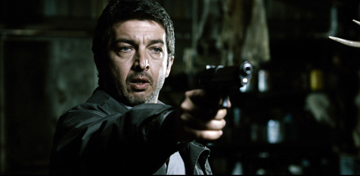 Not The Dixie Chicks, however. Good of the folks at The Pit Stop. They and the rest of us would still do well to broaden our musical horizons, and one way to do that would be through the year’s best musical films. The craptastic Tenacious D in The Pick of Destiny and the wacky, inconsistent Idlewild both deserved better than they got at the box office — Idlewild’s dance numbers set to Big Boi’s raps provided some of cinema’s truly electrifying moments this year. A couple of concert films came up aces, too: Dave Chappelle’s Block Party and Leonard Cohen, I’m Your Man. The Spanish musical 20 Centimeters wasn’t in that league, but it qualified as the weirdest movie of 2006, with a narcoleptic transsexual hooker as its main character, bursting into songs by Madonna, Queen, and Dusty Springfield. Better than all of these was the slice of pop heaven that was Dreamgirls.
Not The Dixie Chicks, however. Good of the folks at The Pit Stop. They and the rest of us would still do well to broaden our musical horizons, and one way to do that would be through the year’s best musical films. The craptastic Tenacious D in The Pick of Destiny and the wacky, inconsistent Idlewild both deserved better than they got at the box office — Idlewild’s dance numbers set to Big Boi’s raps provided some of cinema’s truly electrifying moments this year. A couple of concert films came up aces, too: Dave Chappelle’s Block Party and Leonard Cohen, I’m Your Man. The Spanish musical 20 Centimeters wasn’t in that league, but it qualified as the weirdest movie of 2006, with a narcoleptic transsexual hooker as its main character, bursting into songs by Madonna, Queen, and Dusty Springfield. Better than all of these was the slice of pop heaven that was Dreamgirls.
JEAN: “Monsieur Bobby, by defeating me today you have set me free, and for that I thank you.” [offers his hand]
RICKY BOBBY: “I will never shake your hand, ever. But I will give you this.” [kisses Jean passionately on the lips]
With this spectacular gesture of reconciliation between Ricky and Jean, whose rivalry makes NASCAR and America such interesting places, we kiss off the year’s movies. May the films of 2007 bring more lip-smacking moments like this one.
You can reach Kristian LIn at kristian.lin@fwweekly.com.











